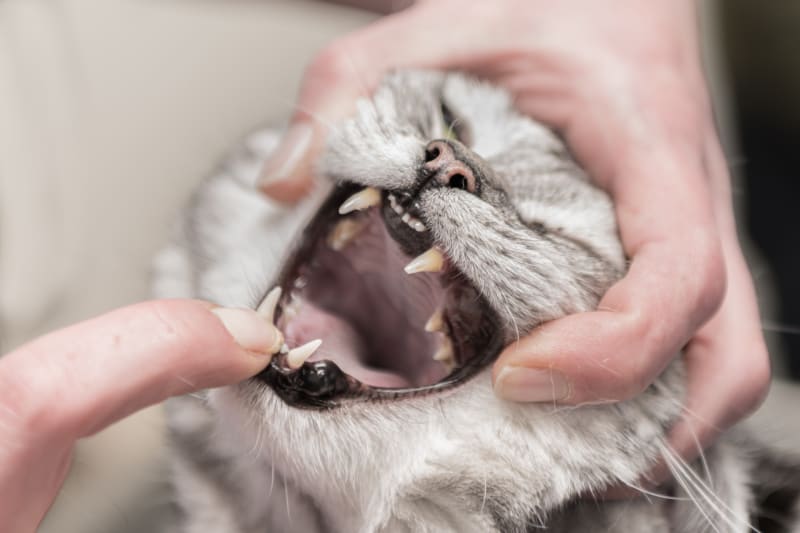Your cat’s gums may be black due to a medical condition or natural pigmentation. Cats, like humans, can experience a range of dental issues, one of which is called oral melanotic hyperplasia, causing black coloring on the gums.
This condition is typically harmless, but it’s wise to consult a veterinarian to rule out potential health concerns. On the other hand, certain breeds, such as black cats or those with darker fur, may naturally have black gums or dark pigmentation.
While it’s important to monitor any changes in gum color, black gums alone may not necessarily indicate a problem. Understanding the potential causes can help you determine whether your cat’s black gums warrant a veterinary visit or are simply a harmless visual trait.
**why Are My Cat’s Gums Black?**
Black gums in cats can be a cause for concern for pet owners. There are several potential causes for this discoloration, and it is important to be aware of them. One common cause is melanosis, a benign condition in which the gums darken naturally. However, black gums can also signal more serious issues such as gum disease, oral tumors, or anemia.
It is essential to keep an eye out for certain symptoms that may accompany black gums, including bad breath, bleeding gums, difficulty eating or swallowing, drooling, or weight loss. If you notice any of these signs, you should seek veterinary evaluation as soon as possible.
A veterinarian will be able to properly diagnose the underlying cause of your cat’s black gums and determine the appropriate treatment. Early detection and intervention can significantly improve your cat’s oral health and overall well-being.
**medical Conditions Associated With Black Gums In Cats**
Cats with black gums may be experiencing medical conditions such as melanoma, gum disease, or certain types of infections, which should be evaluated by a veterinarian. Understanding the underlying cause is crucial for appropriate treatment.
Melanoma And Other Types Of Cancer
Black gums in cats can be a sign of melanoma or other types of cancer. Melanoma is a form of skin cancer that can affect a cat’s gums.
Gingivitis And Periodontal Disease
Gingivitis and periodontal disease can also cause a cat’s gums to turn black. These conditions result from inflammation and infection of the gums, leading to changes in color and texture.
Feline Immunodeficiency Virus (fiv)
Feline immunodeficiency virus (FIV) weakens a cat’s immune system, making them more susceptible to infections and oral health issues. Black gums may be a symptom of FIV.
Feline Leukemia Virus (felv)
Feline leukemia is another viral infection that can affect a cat’s gums. FeLV weakens the immune system and can cause black gums as a result.
Anemia And Other Blood Disorders
Black gums can also be a symptom of anemia and other blood disorders in cats. These conditions affect the blood supply to the gums, leading to changes in color.
In summary, several medical conditions can cause a cat’s gums to turn black. These include melanoma and other types of cancer, gingivitis and periodontal disease, feline immunodeficiency virus (FIV), feline leukemia virus (FeLV), and anemia and other blood disorders. If you notice any changes in your cat’s gum color, it is important to consult a veterinarian for a proper diagnosis and treatment.
**treating And Preventing Black Gums In Cats**
Cats with black gums may be a cause for concern, as it could indicate a potential dental issue or gum disease. Regular veterinary care is essential to address and prevent this condition. Step-by-step guide:
| 1. | Professional dental cleaning and oral hygiene |
| Regular visits to the veterinarian for professional dental cleanings are crucial. These cleanings remove plaque and tartar buildup that can contribute to black gums. Daily brushing with cat-specific toothpaste can also help maintain oral hygiene. | |
| 2. | Nutritional considerations for oral health |
| Diet plays an important role in oral health. Opt for high-quality cat food that promotes dental health. Look for dental-specific formulas or options with larger kibble sizes that encourage chewing, which can help remove plaque. | |
| 3. | Home care practices for healthier gums |
| Regular at-home care can complement veterinary treatments. Incorporate pet-safe dental products such as dental wipes, water additives, or dental treats into your cat’s routine. These can help control plaque and maintain gum health. |
Remember, black gums in cats shouldn’t be ignored. Consult your veterinarian for a comprehensive evaluation and to determine the best course of treatment and preventive measures.
**when To Seek Veterinary Help For Black Gums In Cats**
It is important to seek veterinary help if you notice black gums in your cat, as it can be a sign of a serious underlying issue. While some cats naturally have black gums due to their breed or pigmentation, sudden changes in gum color should be cause for concern.
There are certain situations that may require immediate attention from a veterinarian. If your cat’s gums are black and they are experiencing other symptoms such as difficulty breathing, weakness, loss of appetite, or lethargy, it is important to seek veterinary help immediately. These could be signs of a medical emergency that requires prompt attention.
In addition to urgent situations, regular check-ups with your veterinarian are essential for maintaining your cat’s oral health. Schedule regular dental check-ups to ensure your cat’s gums are healthy and to catch any potential issues early. Regular cleanings can help prevent plaque build-up and maintain overall gum health.
Communication with your veterinarian is key when it comes to addressing concerns about black gums in your cat. Be sure to report any changes in gum color or other abnormal symptoms to your veterinarian, as they will be able to provide appropriate guidance and treatment options.

Credit: www.reddit.com
Conclusion
Black gums in cats can be caused by various factors, including genetics, age, dental disease, and certain medications. It is essential to monitor the cat’s oral health regularly and consult a veterinarian if black gums are noticed. By maintaining a good dental hygiene routine and addressing underlying causes, you can ensure your cat’s overall well-being and prevent potential complications.
Remember, a healthy mouth contributes to a healthier and happier cat!


